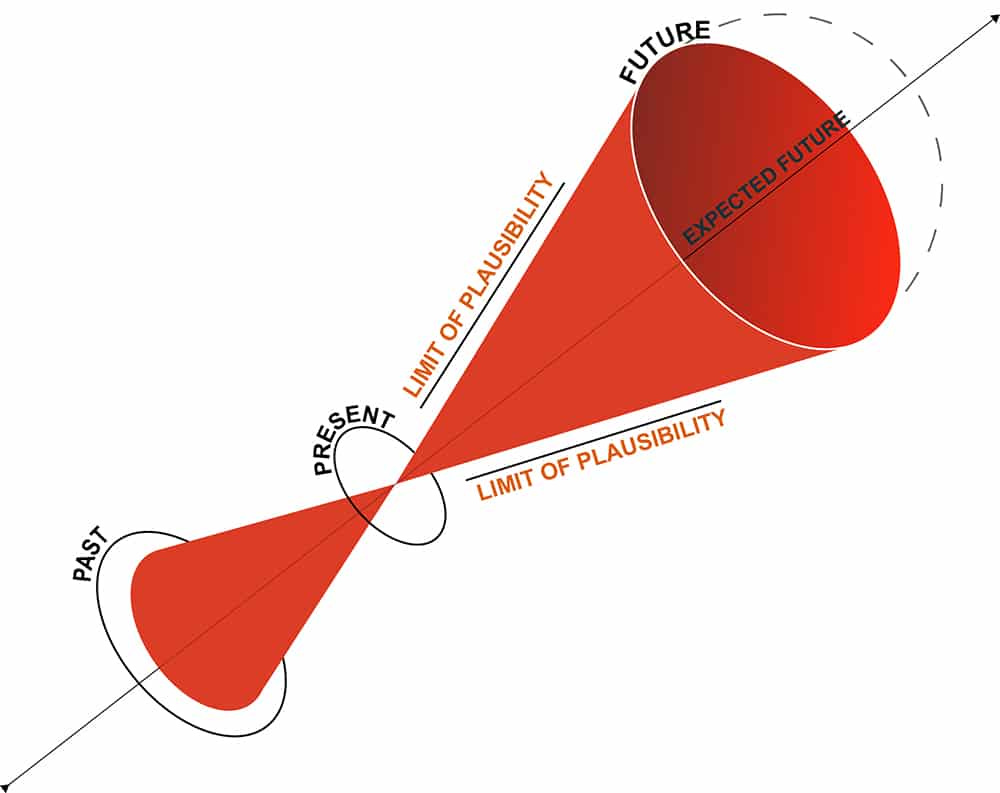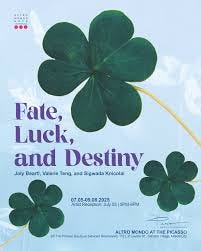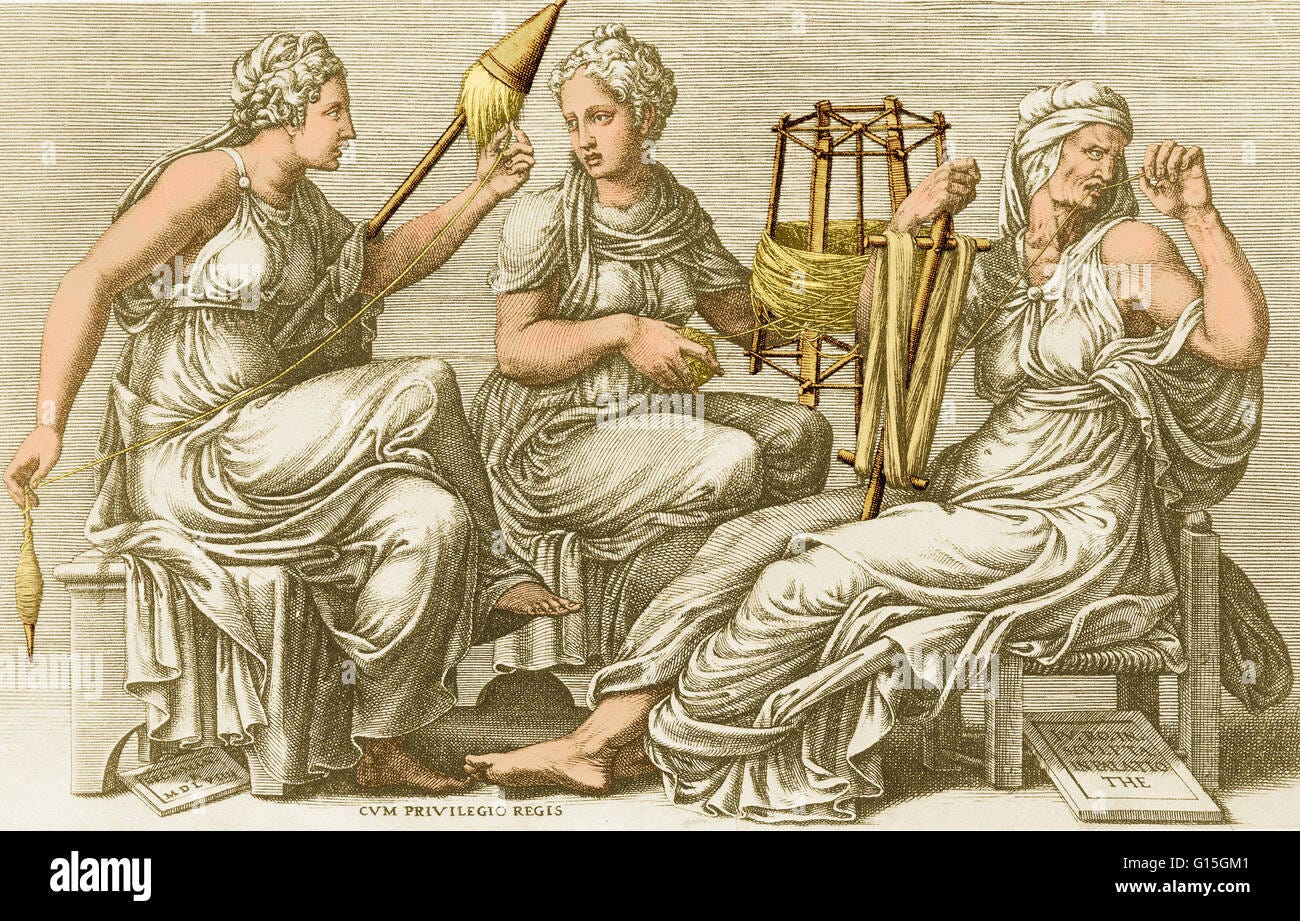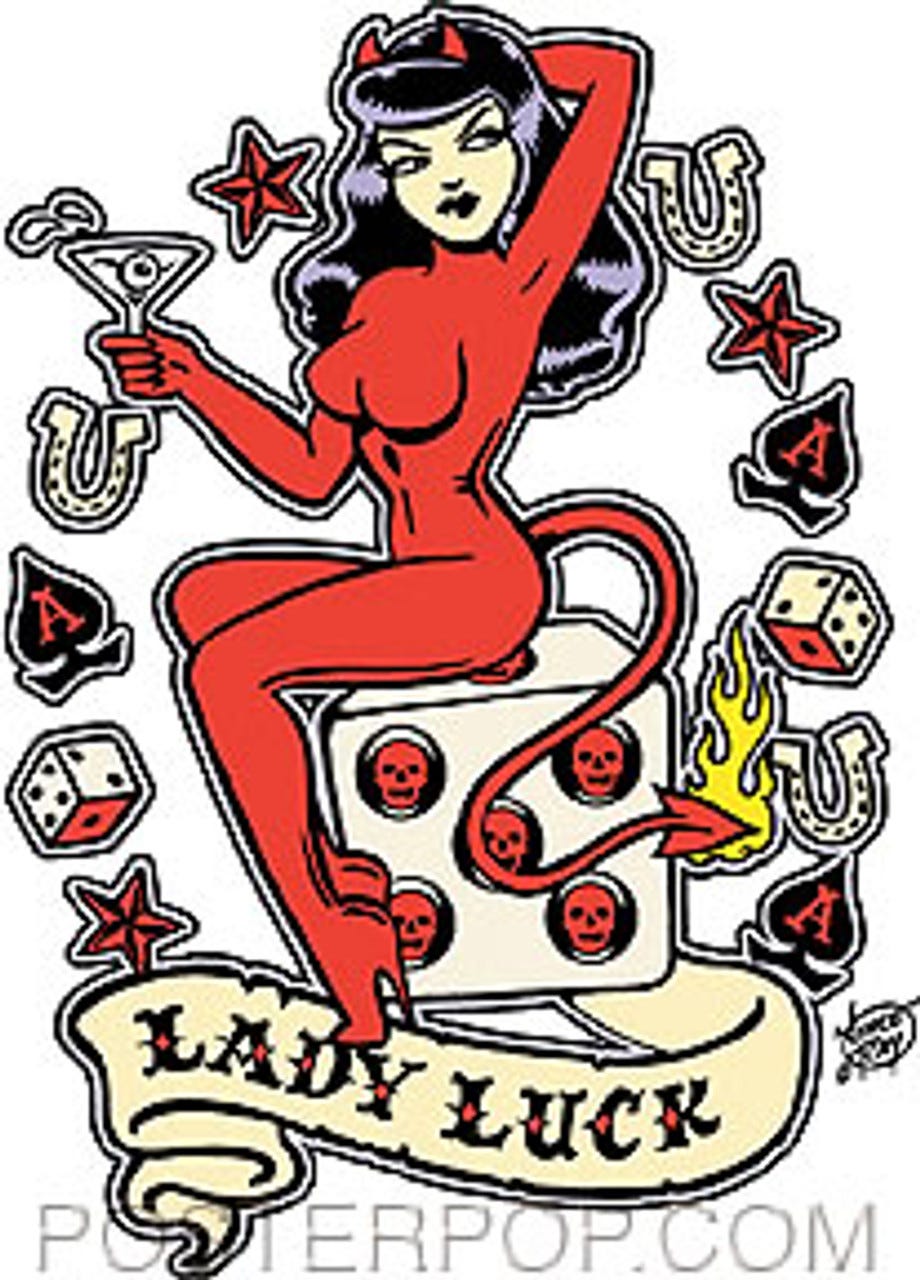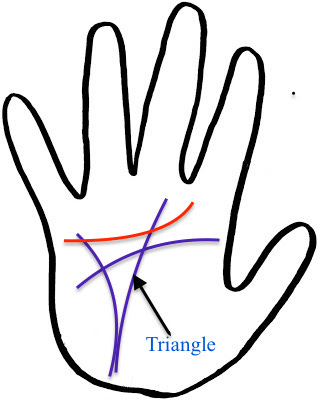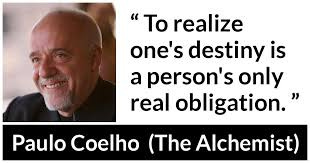Too many therapy concerns are about:
THE PAST is with us as memories of missed opportunities, accumulating regrets, failures, lost loves, and mounting errors in judgment. These are balanced by problems solved, dreams come true, and achievements realized.
In the “cone of plausibility,” the future is represented as a cone that expands over time, with its apex in the present, a POV from the past that is pointed towards the future.
The present exists only as an idea, or a thin slice of “quasi-reality” between the past and the future. When someone says, “I live in the present,” replace the “present” with “near future.”
“Doc, I had this plan for my life, I did all the right things, but this (or that) happened, I married the wrong person, I failed to get the right education, I did something that set me back, or I just frittered time away…now my future won’t be what I was hoping for.”
or
“Doc, when I was 20, I had great potential. I was special; I knew I could be someone if I wanted it enough. I was an athlete [or intellectual superstar, or a handsome, well-liked leader]. Popular in high school, [a cheerleader, a champion debater, a rising star]. I should be wealthy or famous, but I’m not.
or
Looking back, I had too many setbacks, made mistakes, [or someone knocked me off my track], now my future is f**** up… I’ll never straighten it out.
At 69, with a lifetime of experience, I realize I can’t change who I am or what I think I can do, or where I want to go.
I’ve learned to find solace in life as it is now, not how I hoped (or dreamed) it would be.
“All humankind, by our symbolic nature, shape who we think we are, what we feel we can do, and where we want to go.”
My sentiment is a mature perspective from someone who has lived the bulk of life but is still, from time to time, contemplating the future.
This was NOT my POV when I was 30 or even 40 years old.
As we age, our past becomes increasingly influential in shaping our future. Knowing our death is certain, our finite mortality becomes clearer the older we get.
At 30, I was mainly focused on my future. When I am 80 (if I live that long), the future will have little influence over me, even less so than it does now.
This is because my present will collapse into my past, and will encompass my future. At 80, my past, present, and future will blur together, and death will begin to “stare me in the face.”
Perhaps this sounds fatalistic, but, like it or not, this is how it is.
Perhaps, when we die, as Nietzsche posits, we experience an eternal recurrence. Nietzsche was obsessed with the idea, but is not its author. It is, in fact, an ancient concept, re-discovered by the Greeks and labeled as the realm of eternal return.
The label is attributed to Empedocles and Stoicism, a major philosophical force at that time. Even so, the Greeks were not the authors of the idea either. Eternal recurrence is a belief as old as humanity is long.
In “Eternal Recurrence [or return],” the universe and all existence (you and I included) repeat themselves infinitely, including every single event and detail, exactly as it has already been lived.
Sounds boring (possibly frightening), but it might be the way of the future.
We will never realize we are dead until we die, then we do it over again.
How should we judge?
POV
Although the crystal ball of the future is always cloudy, your future can still be discerned, in some cases, with accuracy.
Why?
Because your PAST informs you about your future.
The younger you are, the fewer past experiences you have accumulated, and the harder it is to predict your future.
The older you get, the more past you acquire, but the less future you have left.
Younger people try things because they have fewer failures to caution them, and fewer checks and balances to guide their plans and actions.
They try whatever it is, not aware it is fraught with risk. Perhaps it is too costly to undertake, or too dangerous to attempt, or just flat-out foolish, but they try anyway.
When they fail, we don’t usually hear about it because no one likes to talk about their failures.
But when we try and fail (or succeed), we now know more than we did before we started.
At the same time, we are a little older and may have fewer resources (or more fears and understanding). We might even have more determination. This is because of our previous failures and/or successes.
This is where self-evaluation comes in.
People can, with effort, learn to self-evaluate, especially when examining their past without fear or bias. Self-evaluation can seem mundane or fear-provoking, but it is NOT inherently harmful.
Libraries are filled with books to help people self-reflect and evaluate.
Psychologists help their clients self-evaluate all the time.
As my years of psychotherapy accumulate, my ability to help others self-evaluate evolves. I’m much better at sizing up a life and predicting a future than I was 20 years ago.
Even so, self-evaluating someone else requires knowing yourself. At least well enough to separate yourself and your experiences from the person you are evaluating.
As an outsider, I’ll never perfectly “know” another person, nor will I ever be able to predict another’s future precisely.
But my faculty of judgment has refined over time to a sharp edge. I can discern trouble when it is looming or opportunities unapparent, although it doesn’t mean I can do anything about it.
There are several problems in predicting another’s future: 1. My POV and 2. My profession’s POV.
It is impossible to evaluate a client outside my personal and therapist’s POV.
This is therapist bias and why a therapist is unable to fully grasp a client’s needs.
It’s hard for other reasons.
What other reasons?
Unrestrained “forces.”
What forces?
FATE
LUCK
DESTINY
We all know these.
But do we truly understand them?
FATE
The case of Amir
Doc, I was born in another Country; my parents and grandparents are all citizens of another Country. I immigrated to the USA and went through the steps to be an American Citizen, but I’ll still never be fully recognized as one. My skin color and my face are wrong; I look different, and I’ve had other experiences growing up. I was in a job interview last week, and they hired a “U.S. Citizen,” but it wasn't me, even though I am a U.S. citizen and was the most qualified of the applicants. I’m sure it’s because I didn’t “look” like the person they wanted.
What force shaped Amir’s dilemma?
a. Fate, b. Luck, c. Destiny
The answer is (a) Fate. It could be destiny or bad luck, but FATE fits best.
Define “Fate” (Merriam-Webster): 1: the will or principle or determining cause by which things in general are believed to come to be as they are or events to happen as they do. 2a: an inevitable and often adverse outcome, condition, or end…3a: final outcome…
An adjunctive definition in Merriam-Webster is the plural of fate (or fates): 4. The three goddesses in classical mythology, Atropos, Clotho, and Lachesis, who determine the course of human life.
The story goes like this: There were three sisters: Clotho (the spinner), Lachesis (the allotter), and Atropos (the inevitable). Together, they formed a triumvirate known as the Moirai (FYI: This may be the origin point for the concept of the Holy Trinity in Catholicism).
Moirai was to ensure that every being, mortal and divine, lived out their destiny as it was assigned to them by the laws of the universe. For mortals, destiny spans their entire lives and is represented as a thread spun from Moirai’s spindle.
Moirai is above even the gods themselves, they are the caretakers of the “laws of the universe,” which supersede and control even the acts of the Gods themselves.
Moirai are also the enforcers of fate. Here, the story becomes complex. In some renditions, Zeus, the chief of the gods, at times commands Moirai because of Zeus’s specialness in shaping the “laws of the universe.”
Moirai represents the “past, present, and future.”
Lachesis sings the things that were, Clotho the things that are, and Atropos the things that are to be. Try to guess who each personage is in the picture below.
The Moirai triumvirate idea spans the globe and encompasses all religions (God, Jesus, and the Holy Spirit, three in one - the Holy Trinity) and myths.
Fate is often viewed in a negative light. “The fate of the poor is poverty.”
Why is “fate” mostly negative?
Because of the word itself.
"Fate" originates from the Latin word fatum, meaning "that which has been spoken.”
Tied to the idea that something is declared or spoken, often by divine or supernatural forces, fate pre-determines events.
This is where the linkage of fate and "ill fortune" or "misfortune" originates. Although, by a strict definition, fate can be negative or positive.
Fatalism was the first philosophical viewpoint to emerge from the concept of fate, that all things are predetermined by it. (Think of the Greek idea of eternal return.)
Fatalism does not recognize cause-and-effect; rather, its focus is on (foreordained) results that will occur, no matter what else happens. Fatalism is our "disposition to accept all conditions and events as inevitable."
Embodied in Thomas Hardy’s novels, fatalism is prominent as in “Tess of the d'Urbervilles.” Tess was foreordained to a life of problems and sadness, no matter what she did or the circumstances in life that tried to counteract it.
I enjoy gambling. My game of choice is “Craps.” I play other games, but Craps intrigues me. I enjoy watching the dice roll across the felt, bounce off the wall, and come to rest. For me, it is symbolic of luck in action.
Energy is discharged in the throw to produce a totally random outcome.
I enjoy observing people when bets are won and lost. I’m fascinated by people’s theories for winning a “pure luck” game. I’m curious about their theories on why they failed or what went wrong with the dice. Most of the time, nothing went wrong. What went wrong was luck, which was not in their favor.
Luck is always that way; sometimes in your favor, sometimes not. Who can know?
I love the power of “LUCK.” I only bet on luck when I have a semblance of a chance to win, and in Craps, there are a couple of bets that are as close to 50-50 as it gets.
I always stay within my betting limit. Dr. Hill, why do you bet so much? Because I like to feel the power of luck. I don’t feel this power unless the stakes are high. Of course, I’ve lost quite a bit doing so, but I’ve also won some as well. True to form, my balance is about even. Some days I win, and other days I lose. This is what it means to experience LUCK.
I recall playing on the table, rolling the dice. It seemed every roll I made, I lost. I was losing money and feeling down.
Then, rolling the dice out, I started to win points, meaning I rolled a six, then a second six, before I rolled a seven. When this happens, you win and keep rolling. I was on a winning streak. I did this about eight times in a row, and as I won, I kept incrementing my bet until the amount reached many thousands of dollars.
Why didn’t you walk away when you were ahead? You could have paid for your whole trip and a couple more to boot. Answer: The POWER OF LUCK.
Again and again, I kept winning, never rolling a seven. The dice kept coming back, and the stick man (responsible for pushing the dice) said, “Sir, roll those bones quicker because they’re 'hot,’ I mean ‘hot.’ People around the table were smiling, yelling, “roll, roll!”
I listened to the people, then paused and looked at the stick man. I stood there, then I dropped the dice on the felt and asked for a new pair. The stick man, flabbergasted at such audacity, said, “Sir, what, the H… are you doing? Those dice are hot!”
With new dice, I rolled again, a seven. I lost $4,000.00 on my first rollout. Game over. The stick man said, “Sir, I’m really sorry that happened, but it was your own stupid fault!” “Those old dice were hot, and you were a fool to give them up.”
Was the stick man right?
I think about this event occasionally. Was the stick man right? Or was the stick man under a POV that “the dice are hot,” that there was something in those dice that decided to make sure I would win and win big that day? In his view, the dice had a mind of their own, and I was in tune with them, but then I gave them up. In this case, the dice became angry and made sure that I lost all my money.
Or was it something bigger than the dice? Was it something I couldn’t see that was manipulating my future and wanted me to win, but then I was disappointed by this power?
Some people refer to this force as “Lady Luck.” And, of course, Lady Luck was not pleased with me.
Depending on your POV, you can create a mindset for “hot dice” or assume that Craps is a total game of chance and I was at the mercy of random probabilities the whole time.
Every roll is a new random event, and probabilities conform to a uniform outcome over time, albeit in a random and unpredictable process. This is less sexy than the Lady Luck POV or “hot dice,” but it is what those who deal with probabilities and understand the nature of random events know.
Luck is a funny phenomenon, the exact opposite of fate. Complete uncertainty, in contrast to 100% pre-determined assurance. When I think about luck, the first word that comes to mind is “chance.” The dictionary defines “luck” as:
…success or failure is apparently brought by chance rather than through one's own actions.
Chance is defined as: 1a: …possibility of something happening. 2a: the occurrence and development of events in the absence of any obvious design. 2b: do (something) despite its being dangerous or of uncertain outcome. “She waited a few seconds and chanced another look.”
The American Psychological Association Dictionary does not define luck or chance. Instead, it requires the reader to restate these words in more scientific terminology. I chose “random variation”
APA Dictionary: random (or chance) variation: differences in a dependent variable that are due to chance rather than to the factors being studied. Causes of random variation in test results may include respondent factors, such as health, motivation, attention, concentration, and fatigue; situational factors, such as room temperature, noise, and working environment; and respondent-by-situation factors, such as a respondent not being prepared for a specific rating task. Researchers try to estimate the extent to which random variation may be involved in the study to understand the true impact of the factors being assessed.
In the field of psychology, chance, luck, or random (or error) variation is substantial. Statistics is based on the concept of “chance” or “luck.” When you read about study outcomes, there is always a chance that the result is due to something other than what is being studied (bad luck perhaps). This has led researchers and the public to make erroneous assumptions about the world and what causes what, based on the problematic issue of chance, which Psychologists have labeled “error variation.”
Is there “error variation” that is unexplainable?
The answer is YES. This is where “luck” (and other truth approaches, such as religion and God) reside. This is why science, as a broad strategy for “TRUTH,” has failed and why science, as a way of knowing, will not endure into the future, whereas “God” will always be here.
As a society, we will eventually discard science for a better way. Until then, we are stuck with cause-and-effect (that the power of luck will always undercut).
Destiny has a “romantic” connotation.
The idea that someone, based on an inherent but yet-to-be-manifest propensity, has a future that is frequently mission-like in scope, but this future is not assured, and only likely “if” the person goes through the steps required to realize his/her destiny.
This idea is a “human invention” that introduces the concept of “free will” into the traditional duality of fate and luck. Designed to be conditional (e.g., steps required), leaders, gurus, priests, fortune tellers, gods, and prophets, at times, employ destiny to exert control over their followers through “the power of human fantasy” and belief.
Destiny harnesses fantasy!
Is destiny real?
If unsure, keep reading.
My destiny is to reach for the stars. I want to be an astronaut, but if I don’t go to college, I will never realize my destiny.
Or
Joe was destined to be a great leader, but he f****ed it up when he started drinking alcohol and turned into an alcoholic instead.
Destiny, defined by Merriam-Webster, is 1: something to which a person or thing is destined: fortune. 2: a predetermined course of events often held to be an irresistible power or agency.
(I would add to this definition: “developed by humankind to ensure behavioral norms and limits within a given social system.”) Unfortunately, this aspect of destiny is often overlooked.
The etymology of "destiny" is its synonymous alignment with fate.
Destiny emerged from “Fate.” Fate has an earlier origin, whereas the word “destiny” appeared later, probably in the mid-14th Century.
The word “destiny” comes from the Latin word “destinare,” meaning to “establish” as in a destination.
The Greeks, facing too many constraints in fate alone, probably proliferated the word ˈdestənē as a social safety valve of sorts and a conceptual pathway for theories that involved the management of free will and future prediction.
The Greeks also proliferated two subordinate variations of destiny (under fate): μοίρα, for negative fate, destiny, doom, and τύχη, for positive fate or luck, fortuity, or destiny.
These contrasting emphases strengthened destiny as a fate-choice-mediated concept.
As things evolved, destiny ultimately took on a positive valence, whereas fate became primarily negative.
If fate alone existed, then there would be no philosophical perspective beyond the “pre-ordained.” This means we would all be stuck with “fatalism.”
Therefore, destiny has a conditional twist. The future can be altered by free will or individual choice under certain conditions.
Palmistry incorporates destiny into its predictive tools, utilizing the fate, luck, and destiny triangle. Destiny is necessary here because, without it, there is no hedge. A Palmist would be blamed for every incorrect prediction. By employing a destiny component (along with luck), they can build in prediction error without having to take responsibility for it.
Without destiny, humankind would be blind automatons controlled by the whims and forces of fate and luck. It was Epicurus who, based on a logical argument around this concern, first proposed that humans can act and, therefore, shape their future.
He used the concept of “destiny” to make this point. Epicurus is likely the person who formalized the idea of destiny, although the notion of destiny has existed as long as humans have lived.
We all love it when destiny is realized. Great novels are made from the successes and failures of destiny-driven others. Good and evil hinge on destiny as destiny is realized or goes awry.
Destiny gives us a sense of specialness. Most religions employ a “destiny” tenet to attract (and hold) their followers because, without destiny, it would be impossible to convince people to follow (and stay with) any religious ideology.
Religion, across the board, promises a glorious future as part of its core tenets, which can only be realized if one does what they are “supposed” to do, as defined by the religion. Every religion is conditional, even Buddhism. You will discover this if you think deeply enough about the Buddhist ideology.
Is destiny real? It depends on your POV.
For some, especially the religious, it is real; for others, it is simply another fantasy that the human mind has drummed up to make us feel special. In the end, whether destiny is real or not is up to you.
I end this entry with some questions.
What makes human beings tick? Is it our mind/soul/spirit, our sense of fantasy and self-awareness, or is it something else, our body, heart, lungs, and brain?
Do we exist? This question comes from our mind, not from our brain. Our brain doesn’t question our existence; it just functions. It is somewhere in the mind that questions of this type arise. We can feel, touch, see, talk, hear, and understand. Our brain processes these sensations, and it seems our mind interprets the bio-information that has been processed. We can be hurt, damaged, or changed. We can improve ourselves. We live with others. This is our humanness.
Are we all shaped and molded by the forces of luck, fate, and destiny?
Answer: This one is above my pay grade. So, I leave the answer to you.





